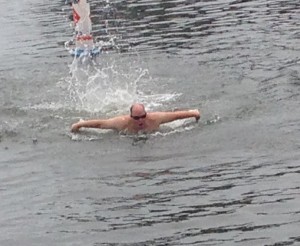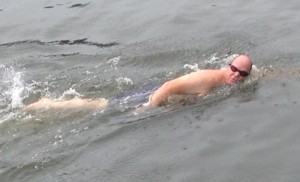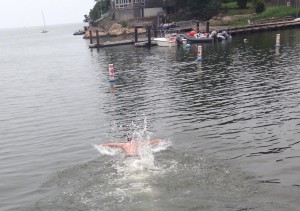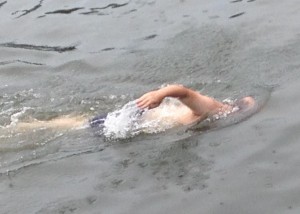I’m very excited to be joining Suzanne Conklin Akbari’s fast-moving project, How We Write: Thirteen Ways of Looking at a Blank Page. The project asks a variety of academic writers from assorted professional levels and disciplines, to write about how we (really) get words onto pages.
I wrote about what I usually write about:
What if we think of writing as an encounter with all the alien environments outside us? When I think about writing as process, metaphorically and physically, I return to the central obsession of my recent work, the human encounter with an alien globe best represented (to me, anyway) by the ocean. But the wet work of writing also includes encounters with an infant’s scream or an indecipherable manuscript. There’s no “right” way to pursue this encounter and make words from it, only a series of techniques through which we can put off being overwhelmed. Writing emerges from putting little bodies in contact with vast seas. If we try too hard to stay in control we’re treating language as a mere tool, something we can master. Words are the best machines humans have constructed, but they are also perhaps our least ready to hand, most mystifying and frustrating. Wet work: it’s through our efforts to employ language that we’re reminded most insistently of the limits of body and mind.
Writing is like fishing in that it involves flashing a lure into the unknown and hoping that something bites. It also resembles fishing in that there’s a wanton cruelty to dragging living meanings up to the surface so that we can see them. Sometimes it feels as if they should stay in the water.
Writing like swimming requires a naked encounter with unimaginable seas. I started writing about the sea by way of Northrop Frye and James Cameron: an odd combination. The great Canadian professor joked that shipwreck was the “standard means of transportation” in Greek romances and their early modern imitators (Sidney, Greene, Lodge, Nashe) about whom I wrote my dissertation and first book. The American filmmaker’s sugar-sweet movie about the great ship going down showed me that shipwreck retains its potency even inside melodrama, not secret so much as unspoken, because it doesn’t require words.
Writing as swimming floats in the cold water where Leo goes down. It treads water happily, patiently, knowingly, waiting for insight. It’s not comfortable and it can’t last. We’re not in control.
This essay also has more baseball in it than usual:
For this child of the New Jersey suburbs, sports still has the best metaphors. Here’s one I start with:
Writing Maxim #1: “Swing hard, in case you hit the ball.”
The baseball metaphor highlights chance and difficulty: some key parts of the writing process, as I semi-understand it, remain out of the author’s control. The maxim encourages getting comfortable with failure, because that’s what happens most of the time. So much of writing feels like chance and failure – you practice and practice, get your swing just right, hope for contact, and most of the time you miss the ball. Writing isn’t about control, no matter how hard we work at it. “You can’t aim the baseball,” intones the sonorous announcer’s voice that accompanies me on my evening commute from April to (if we’re lucky) October. It takes all your skill just to make contact, and then hope something good happens. If not, take another swing.
And more combat academic parenting:
I’ve got a picture, somewhere, that must have been taken in February 2001. I’m drafting a paper for the Shakespeare Association of America conference about economic thinking in The Merchant of Venice. (You can find a later version of it in the 2003 collection Money and the Age of Shakespeare, edited by Linda Woodbridge.) In the picture, I’m sitting in a chair with a paperback open to Launcelot Gobbo’s great speech about the pleasures of being an unscrupulous middle-man: “The fiend gives the more friendly counsel, I will run, fiend, my heels are at your commandment” (2.2.1-32). On my shoulder is my month-old son, red-faced and screaming. A colicky infant, he gave us about three or four hours of high-volume serenade each day for his first year or so. I was reading my paper to him – I’d started with The Odyssey in the hospital, sentimentalist that I am – and writing it at the same time. Surely some of his rage and force found its way into my sentences. I thought I was writing about the “new economic criticism,” about which I didn’t really know that much, except what I’d just started reading. But the picture shows that I was writing with and to him. In other words: rage and love, along with money and exchange.
It’d be easy to look at that picture and say I was distracted, and to think that the only responsible and professional way to write a “real” SAA paper would be in a quiet space, preferably a library carrel or a child-free office. But I don’t think that would have birthed a better paper, even if I had been able to find such a place that noisy winter. The shock of fatherhood was so new to me then – he’s fourteen now, but it still feels new – that there’s no way I could have not been writing about it, through it, with it. I remember being frustrated that the paper wasn’t as polished as I could have wished – I didn’t really know at that point about the multiple drafts and revisions between conference paper and published article; another practical secret I could have benefitted from hearing earlier. But now I think of that paper as a transition, the first writing I did as a parent, an introduction to the distracted and emotional way I’ve been writing and living ever since.
I have two favorite parts. I like the pictures posted here that my daughter Olivia took of me today, in my summer writing office.
This paragraph is my other favorite part:
Here’s the thing: you can only write what you’re ready to write, in a moment, in the encounter. You can’t aim the baseball. You can prepare yourself – block off time, face the page or keyboard, assemble notes and outlines, sit pinioned in a too-small airplane seat – but you can’t control what happens in the writing moment. I don’t know what’s happening in this moment, now, not entirely. That’s the good news: it’s through writing that humanists create new knowledge. It’s good to surprise ourselves, when we can.




[…] to keep this press working. If you can’t wait, Steve Mentz has posted some of his piece here; Jeffrey Jerome Cohen has a draft here; and a couple of blog posts that sparked the whole thing are […]